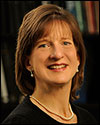A surge in computer science majors has sparked a concerted effort to review more CS programs abroad.

“Our CS program is exploding,” said Engineering Associate Dean Cynthia Paschal. “We’ve spent the better part of a year working Isabelle Crist, assistant director of operations in the Vanderbilt’s Global Education Office, on course reviews and program evaluations to expand enrollments of computer science students in direct-credit programs, which means courses and grades factor into the Vanderbilt GPA.
Paschal and Crist worked closely with Julie Johnson, associate professor of the practice of computer science and director of undergraduate studies in computer science, to create curriculum plans to guide students’ course selections at Vanderbilt and at various foreign universities.

“Adding the sample curricula to our Study Abroad website helps CS students see how they can study abroad and meet all degree requirements and still graduate on time,” Paschal said. Of the 36 engineering students who studied abroad in the spring, 13 were CS majors and four were CS minors.
Navigating degree requirements and studying abroad were critical for Nicholas Hyman, a triple major in CS, chemistry and applied math from Alpharetta, Georgia. He spent the spring 2017 semester at the University of Edinburgh.
“The biggest effect studying abroad had on my computer science major was definitely working with other University of Edinburgh students and American students. It was interesting to learn about their computer science backgrounds and how they approached problems differently,” said Hyman, who had never traveled beyond the United States.

Unlike programs at many universities, students remain enrolled at Vanderbilt while they are abroad, which means they receive full Vanderbilt credit for the courses taken abroad and receive all or most of their usual financial aid when they study for a semester or longer.
Paschal points to a number of strategies that help boost participation in study abroad. “They include identifying many programs abroad where engineering courses are taken in English, developing examples of how courses abroad can be integrated into our curricula, streamlining the course evaluation process, and making course evaluation results highly accessible and searchable online.”
In addition, incorporating Maymester and summer programs, allowing transfer credit for programs not offered through Vanderbilt, providing financial support for study abroad, and offering distance learning when needed for a specific requirement also supports study abroad participation.
“The net result is that here at Vanderbilt, students in the School of Engineering study abroad at two to three times the national rate with clear benefits to students and the institution,” Paschal said.
Thirty percent of the class of 2017 studied abroad; 24 percent of the classes of 2016 and 2015 did. The national average about 15 percent, according to the Institute of International Education’s Open Doors 2016 report.
Employers with global operations value students with international experiences, Paschal said. “Students who choose to study at a foreign university gain a perspective that better prepares them for an international workforce.”
Hyman agrees. He saw how computer science transcends language and culture barriers. “I loved traveling in Europe and I might eventually want to live abroad. It was great to know that my CS major would provide me with such universal skills.”
Contact:
Brenda Ellis, (615) 343-6314
Brenda.Ellis@Vanderbilt.edu
Twitter @VUEngineering